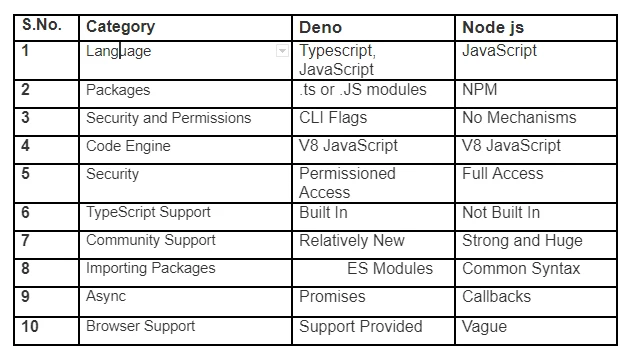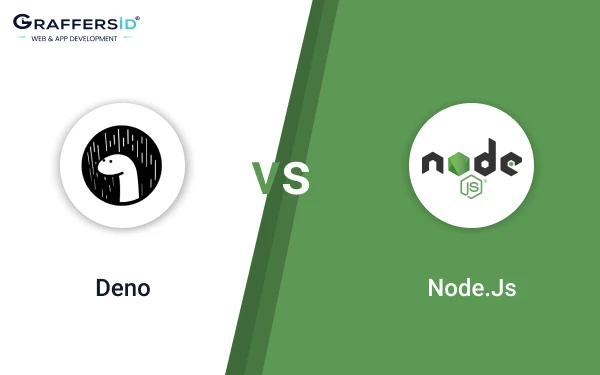JavaScript is among the most widely used data processing language which is supported by all operating systems. The JavaScript language has undergone constant development due to the large number of developers who are highly competent in it.
A highly used platform called Node.js has successfully represented JavaScript everywhere. We must accept that Node.js has changed how web development is done and enables JavaScript to be used for backend development. With the greatest developer community, Node.js has a sizable user base.
Thoughts quickly spread that Deno would take the role of node.js once JavaScript released it. The debate on Deno VS Node is inevitable.

What is Deno?
Deno is a runtime for JavaScript and TypeScript that depends on the V8 JavaScript and the Rust programming language. Ryan Dahl, Who was also the founder of Nodejs, and is centered on profitability, made it.
It was founded by Dahl in the year 2018. Now the question arises for what reason does Deno utilize rust? Deno is a safe TypeScript run-time on Chrome V8. It was initially written in Go and now has been revamped in Rust to stay away from potential garbage man issues.
Deno is like Nodejs yet is centered around security. The reason for which Deno made was JavaScript. Far more terrible than having a contender who realizes your item back to front, Deno was made explicitly to fix what Dahl saw as the vital shortcomings of Nodejs — including security issues, use of a centralized repository system (npm), and heavy tooling.
So the advantages of using Deno are
- It Uses ES6 module guidelines
- It is compatible with Typescript with Deno there is no compelling reason to arrange and design Typescript for you, it simply works out of the box.
- As it is implicit Rust is a blasting quick programming language that is enabling individuals to construct solid and productive software.
- It has great built-in security.
What is Node?

Node is an open-source, cross-platform; back-end JavaScript runtime environment that suddenly spikes in demand for the V8 and executes JavaScript code outside an internet browser.
They use Nodejs to assemble various kinds of applications, for example, command-line applications, web applications, real-time chat applications, REST APIs, and so forth. In any case, it is essentially used to assemble network programs like web developers. Does the main question arise for what reason is Node famous?
Nodejs can deal with numerous simultaneous requests. This is the fundamental explanation; it immediately was well-known among designers and enormous organizations.
The node can deal with numerous simultaneous requests without stressing the developer. It has the quickest run time among all programming languages, because of the prevailing language and furthermore the assistance and support by the significant programs.
Future seems, by all accounts, to be splendid for Node in the front-end world as it seems like no front-end improvement is conceivable without Node in any event until further notice.
How Deno is different from Node

- Deno upholds TypeScript out of the case. It can likewise manage JavaScript, with no issue, out of the case.
- Deno utilizes a consent framework for code to be executed.
- It utilizes Rust in the engine, yet additionally, the V8 engine is actually like Node.js.
- Deno does not uphold NPM Packages and does not utilize the Node_modules index. Libraries are imported through the URL.
- The window object is upheld in Deno — despite the fact that we are composing back-end code.
Since its declaration, Deno has produced a considerable amount of interest in the JavaScript community. As a JavaScript runtime planned by the maker of Node, you may expect there to be a lot of similarities between the two activities, and there are. Nonetheless, there are likewise significant contrasts, which means you cannot simply substitute one for the other.
1. Language Support
Both Deno and Node are JavaScript runtimes, permitting JavaScript code to be executed on a PC outside of an internet browser.
2. The similarity module
Deno furnishes a similarity layer to permit you to reuse existing Node bundles. It’s not yet complete, yet it does right now uphold stacking CommonJS modules through required, in addition to other things.
3. Package Management
Package the executives is one region where Deno addresses an extreme takeoff from Node’s method of getting things done. As it’s still early days for Deno, it stays not yet clear if its methodology will end up being beneficial.
4. APIs
Deno and Node both uncover their own API
s to developers, permitting us to compose programs that can really do valuable things like peruse and compose documents, and send and get network demands.
5. Outsider Packages
A language can flourish or pass on the liveliness of its environment, as efficiency depends on not rehashing an already solved problem! Here, it appears to be that Node at present has the edge.
6. Security
Maybe one of Deno’s most promoted upgrades over Node is the framework of the consent.
7. Deno’s standard library
One way that Deno endeavors to improve the developer experience is by giving a standard library of assistants and utilities for normal assignments. The center developers guarantee superior grades, and dependable code, and evaluate all modules.
Here are Nodejs advantages and disadvantages
Node.js: Pros and Cons
Node.js has been around since 2009 and has gained a massive following in the JavaScript community. Here are some of its key advantages and disadvantages:
Pros:
a) Vast ecosystem: Node.js has a vast ecosystem of libraries and packages available through npm (Node Package Manager). This extensive collection makes it easy to find and integrate third-party modules into your projects.
b) Mature community: With a large and active community, Node.js has a wealth of resources, tutorials, and online support available. The community’s experience and contributions have contributed to the stability and growth of the platform.
c) High performance: Node.js is known for its event-driven, non-blocking I/O model, which allows it to handle a large number of concurrent connections efficiently. This makes it ideal for building real-time applications and APIs that require high performance.
Cons:
a) Callback hell: The extensive use of callbacks in Node.js can lead to complex and nested code structures, often referred to as “callback hell.” This can make the code harder to read, maintain, and debug.
b) Security concerns: The open nature of the Node.js ecosystem means that developers must be cautious when incorporating third-party packages. Vulnerabilities in dependencies can potentially expose applications to security risks.
c) Single-threaded: While Node.js is highly efficient at handling concurrent I/O operations, its single-threaded nature limits its ability to effectively utilize multiple CPU cores. This can become a bottleneck when dealing with computationally intensive tasks.
Deno: Pros and Cons
Deno, being a relatively new platform, bring some fresh ideas to the table and aims to address some of the perceived drawbacks of Node.js. Let’s explore its pros and cons:
Pros:
a) Improved security: Deno introduces a more secure runtime environment by default. It provides fine-grained control over file system, network, and environment access, ensuring that only explicitly granted permissions are allowed.
b) Simpler module management: Deno takes a different approach to module management by allowing modules to be imported directly from URLs. It eliminates the need for a centralized package registry like npm and provides a more straightforward and secure way to manage dependencies.
c) TypeScript support: Deno has built-in TypeScript support, meaning you can write and execute TypeScript code without additional configuration or build steps. This simplifies the development process and improves code maintainability.
Cons:
a) Limited ecosystem: Compared to Node.js, Deno’s ecosystem is relatively new and smaller. Although it can leverage existing npm packages through a compatibility layer, not all modules are compatible, and developers may face challenges finding Deno-specific packages.
b) Immaturity: As a newer platform, Deno is still evolving and may have some rough edges. While its design choices are aimed at addressing Node.js’s shortcomings, it may introduce its own set of trade-offs and limitations.
c) Learning curve: Migrating from Node.js to Deno may require some effort, as the two platforms have different APIs and programming models. Developers familiar with Node.js may need to invest time in learning Deno’s unique features and best practices.
Will Deno replace Node in 2023?

Possibly or perhaps not. Node js has a solid and tremendous ecosystem of developers. Then again, Deno is in its incipient stage and will set aside an effort to make up for the lost time.
Now, Deno is a cool new environment to build scripting projects in TypeScript. As indicated by Dahl, Deno will not ever truly challenge the achievement of Node thinking about the prevalence.
By the by, when Deno develops it might turn into a suitable decision for building bigger ventures.
To find the answer which is faster let’s see the difference between Deno vs Node:
| Feature | Deno | Node.js |
|---|---|---|
| Language | TypeScript (JavaScript) | JavaScript |
| Package Manager | None, uses import statements | npm |
| Built-in Support for TypeScript | Yes | No, requires additional configuration |
| Security | Sandboxed by default, no file, network, or environment access without explicit permission | No sandboxing by default, full access to file system, network, and environment |
| Standard Library | Comprehensive and modern | Limited, requires many third-party libraries |
| Performance | Comparable to Node.js | Well-established and widely used, with a large number of available modules and libraries. |
Deno is a relatively new player in the field, released in May 2020 by Ryan Dahl, the creator of Node.js. It is written in Rust and built on top of the V8 JavaScript engine. Deno aims to provide a more secure, modern, and productive development experience by eliminating the need for a package manager and built-in support for TypeScript. Node.js, on the other hand, is a well-established and widely used platform that has been around since 2009. It has a large number of available modules and libraries, but lacks built-in support for TypeScript and has a limited standard library.
Is Deno Faster than Node in 2023 and the future?
We can also say that Deno is the improved version of Node, which is a faster, more secure, and more modern tool to build apps. Node js gives npm to deal with your packages. Nevertheless, Deno allows you directly to introduce packages from the URL or directly use them by bringing in packages as a library in the scripts from the URL.
This is perhaps the greatest benefit of Deno. Deno will not replace Node. The truth will surface eventually about whether Deno will get. Right now or soon, Node is the best approach, and whenever placed in the expressions of Ryan, Node is not going anywhere.
Do people get confused when it comes to picking between Deno vs Node? The objective of Deno is not to replace Node, yet to offer another option.
Node has been a work in progress for longer than 10 years, which makes it more steady and flight-tested, making it the true norm for worker-side JavaScript. Deno has just been a work in progress for only two years and keeps on being improved.
In addition to other things, Deno is a fantastic trade for utility contents that are normally composed with bash or python.
It will rely upon the necessities, however, for most of the Node applications, Deno may not be a fit at the present time. One of the primary obstacles to handle is the creation/transformation of NPM modules to be utilized with Deno, and this will most likely change later on when Node ES Modules’ backing will turn out to be more common.
Want to know Python vs Nodejs: Which is Best for Your Project
Why use Deno?
Deno should be contrasted more noteworthy and Node than with ts-Node because in reality, Deno is a completely new runtime while ts-hub is a module for Node so your program run with ts-hub practically utilizes the Node runtime.
Deno is a very new project that effectively has many footholds. It doesn’t have as decent arrangement documentation or libraries as Node however it technique that very well may be a wonderful opportunity to get included because of the reality while it gets more mainstream.
I figure it will for bounty reasons which are past the extent of this arrangement, people who as of now have delighted in with it’ll be required available, think that it’s compelling to become with Node.
In any case, I figure we will continuously see Deno get increasingly more due to its top-of-the-line TypeScript backing and current standard library.
NodeJS developers should watch out for Deno and perhaps attempt to utilize it for some projects by side.
One thing is certain, Deno’s present improvement is pushing the JS worker ecosystem forward and that is something worth being thankful for.
Read Also: NodeJS vs AngularJS: Which is Better?
When Should You Wait Before Trying Deno?
People dislike change occasionally because it is difficult, they are too ingrained in their current technology, and the benefits don’t appear to outweigh the risk of making the transition.
Another major challenge is the support for Meta frameworks. Deno doesn’t provide a compelling narrative for these frameworks.
Interoperations of Deno with NPM and Node JS
Even though Deno is rather strong, many users will prefer to use programs and libraries created for Node, especially the vast array of packages offered on the NPM repository.
NPM specifiers realized the need for the functionality to make Deno and Node JS interoperable. Therefore, Deno users don’t need to install NPM in order to utilize several NPM libraries. However, this functionality is still being worked on.
With the release of version 1.15, Deno offers a compatibility mode that enables direct consumption of code created for Node by simulating the Node environment.
Is Deno Better Than Node?
Deno is a framework released by Google to assist web developers in building highly scalable single-page applications. It was developed by Google, and the code is open source.
NodeJS, on the other hand, is an open-source server implementation of JavaScript and it is used to power a large number of popular websites.
Both Deno and NodeJS are great technologies for web development. If you are looking for high performance, then the Deno framework would work better for you. However, if you want to build servers for your application quickly then NodeJS could be your best bet.
Can Deno Replace Node?
Deno is a new web framework that is trying to succeed in Nodejs. It has been created by the same team that contributed to Nodejs. Some arguments against Deno are that it does not yet have all of the features of Nodejs and that it doesn’t have a lot of support from the community or from ecosystem packages.
Some people believe that Deno is not able to replace Nodejs because it lacks some features and does not have community support.
Can Deno be the Future In 2023 & Beyond?
Over time, the commitment to security and Web standards will lead to Deno becoming the explicit JavaScript runtime. Unfortunately, Node JS is used to build a lot of tools and higher abstractions.
Changing runtimes, regardless of the runtime, is a lot of effort because there are so many frameworks and technologies utilizing Node, even though Deno is growing and being a popular runtime. Adding to the difficulty of leaving the node is the fact that the node compatibility layer of Deno isn’t yet complete. Ultimately, Deno is still a small project, thus most applications will probably continue to use Node for the time being. As a result, I anticipate that Deno won’t be utilized more frequently than it is now for the next few years.
Deno vs Node Performance: Which is Faster & Better in 2023?
The competition between Deno and Node is intensifying as both technologies evolve with new features and performance upgrades. As developers look to create faster, more efficient applications in 2023, they are increasingly turning to Deno or Node for the best results. Both technologies offer great performance and scalability, but the question remains: which is faster and better for developers in 2023?
It is difficult to say which one is faster and better as it will depend on the specific use case and requirements of the project.
In terms of Deno and Node.js performance, Both are built on top of the V8 JavaScript engine and should have similar performance characteristics. However, Node.js has a more mature ecosystem and a wider range of libraries and modules available, which can make development faster and more efficient.
In terms of security, Deno has a more secure by default approach, as it runs in a sandboxed environment and does not have access to the file system, network, or environment unless explicitly granted. This makes it more resistant to certain types of attacks.
In terms of development experience, Deno has a more modern and productive approach, as it eliminates the need for a package manager and provides built-in support for TypeScript, which can improve the quality of the code.
So it would be better to evaluate both options based on the specific requirements of your project and choose the one that best fits your needs.
Conclusion
With that said, the outcome with 10 simultaneous associations is more significant truly; Node wins for the performance round. Despite the fact that Deno performs better in the – c100 test, which implies Deno is showing improvement over Node in a higher rush hour traffic network.
Numerous programmers will use Node for some jobs and Deno for others. In order to improve your programming abilities, don’t be afraid to study both platforms. They can provide you with fantastic prospects for back-end development.
Although Deno is more secure and offers contemporary benefits, Node JS is still the most popular JavaScript runtime environment.
It’s important to keep in mind that some of the advantages Deno offers may be transferred to Node.js with the aid of third-party packages while choosing between Node.js and Deno. Thus, if there are just one or two aspects of Deno that you find appealing, chances are good that you can accomplish the same thing with Node JS, albeit not quite as smoothly.
Finally, I additionally need to specify one point. Execution isn’t the key to progress for a GraffersID. Want to hire NodeJS developers to get your project on time with full finishing in terms of design responsiveness etc?
GraffersID also provides startups to hire dedicated remote developers, according to their project requirements. They can bring your dream project into the digital market. We have a very talented team of experts who have developed several apps.
Frequently Asked Questions
Q: Which one should I choose, Deno or Node.js?
A: The choice between Deno and Node.js depends on your specific use case and requirements. If you are looking for a more secure and simpler runtime environment with built-in TypeScript support, then Deno may be a good choice. However, if you require a mature ecosystem and more robust tooling, or if you have existing Node.js code that you want to reuse, then Node.js may be a better option.
Q: What is the future of Deno and Node.js?
A: Both Deno and Node.js are actively developed and maintained by their respective communities, and are likely to continue evolving in the future. Deno’s focus on security and simplicity may make it a compelling choice for certain types of applications, while Node.js’s mature ecosystem and tooling may make it a more versatile choice for a wider range of projects. Ultimately, the choice between Deno and Node.js will depend on factors such as project requirements, team expertise, and personal preference.
Q: Can I use Deno and Node.js together?
A: Yes, you can use Deno and Node.js together. Deno can load Node.js modules through a third-party compatibility layer, while Node.js can call Deno scripts using child processes or HTTP requests.
Q: Can Deno run Node.js applications?
A: Deno is not designed to run Node.js applications directly, as it uses a different module system and runtime environment. However, Deno can execute JavaScript code written in Node.js by transpiring it using tools such as “ts-node” or “babel-node”.
Q: Can Deno be used for front-end development?
A: Deno can be used for front-end development, but it is primarily designed for server-side development. For front-end development, there are other tools and frameworks such as React, Vue.js, and Angular.
Q: Does Deno have a larger or smaller community compared to Node.js?
A: Deno is a newer technology and has a smaller community than Node.js, which has been around for over a decade. However, Deno has been gaining popularity and has an active community of developers who contribute to its development.
Q: Is Deno more secure than Node.js?
A: Deno is designed with security in mind, and it provides several security features such as sandboxed execution, file system permissions, and explicit permissions for network access. However, Node.js can also be made secure by following best practices and using third-party security modules.
Get In Touch With Us
[quform id=”1″ name=”Contact Form Footer”]




